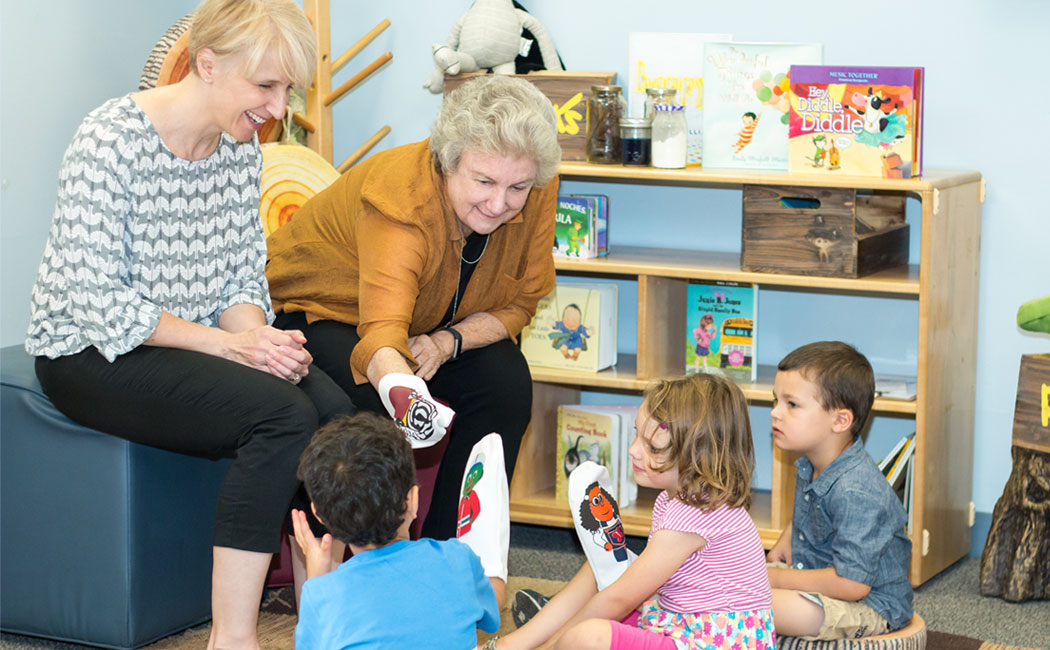
Gregory is having a bad day. A school field trip has been canceled, and he is angry.
He is joined by a teacher and a kindergartner, who together discuss ways Gregory might cope with his emotions and keep his behavior under control.
“These are some things he might want to do,” the teacher says. “But there are other things he could do instead.”
The teacher suggests ways Gregory can deal with his disappointment. The kindergartner offers some suggestions, too, and before long, Gregory is feeling better about things.
But Gregory is not a child. He is a puppet — Gregory the Grumpy, one of the main characters of INSIGHTS, a comprehensive, preventive intervention that helps early learners understand their temperament and the temperaments of others. The process teaches children how to interact with others, and helps parents and teachers craft strategies that match a child’s temperament.
Developed in 2008 by New York University researchers, INSIGHTS is delivered to children once a week for 10 weeks in kindergarten and first-grade classrooms. Teachers use puppets and drama therapy techniques to teach children that while certain situations may be easy for some individuals, they may be more challenging for others. The children engage the puppets in daily dilemmas to encourage empathy and strengthen their problem-solving skills.
Interaction with the puppets can be tailored to each child’s individual temperament, and helps children begin to identify temperaments most like their own.
“INSIGHTS helps children create a good emotional foundation and develop self-awareness, which often, many adults don’t have,” said Gwen Nugent, CYFS research professor and principal investigator of the project, which replicates the NYU research. “It not only helps children understand behavior motivations of other children, but it also helps parents and teachers understand those motivations.”
Research will be conducted in 30 rural elementary schools in eastern and central Nebraska. Study participants will include approximately 630 children and their parents.
During the study’s first year, kindergartners will receive INSIGHTS intervention in spring 2019, with assessments before and after. The same group will receive INSIGHTS in fall 2019 as first-graders. A final assessment will take place the following spring, as the next group of kindergartners receives its initial INSIGHTS interaction.
Parents also receive intervention during the same 10-week period as the classroom intervention, learning how to better deal with their children’s behavior.
“INSIGHTS teaches kids to stop and think about how someone else might feel, before they assume there is negative intent,” said Kathleen Rudasill, professor of educational psychology and associate dean for research and faculty development at Virginia Commonwealth University — and the developer of the Nebraska project. “For example, a shy child might be viewed by classmates as someone who doesn’t like them, when that isn’t really the case.”
For more comments from Rudasill, visit https://vimeo.com/279701707
Nugent notes that INSIGHTS was found to have improved the attention skills of economically disadvantaged children in a previous study conducted in New York City. Additionally, the students’ mathematics and reading abilities also improved, likely driven by INSIGHTS’ enhancement of critical thinking skills, she said.
Although the Nebraska study is the first INSIGHTS efficacy trial to be conducted outside a large, urban setting, Nugent and Rudasill expect the same core results: improvements in attention, behavior and critical thinking. They also believe Nebraska teachers, like their New York counterparts, will enjoy better overall classroom behavior thanks to improved student interaction.
One added element of the Nebraska study is teacher training that will continue at the end of the 10-week intervention phase.
“The benefits will continue and outlast the study,” Nugent said.
The five-year grant is funded by the U.S. Department of Education’s Institute of Education Sciences. Along with Nugent and Rudasill, the research team includes co-PIs James Bovaird, director, Nebraska Academy for Methodology, Analytics and Psychometrics; Lisa Crockett, professor of psychology; and Susan Sheridan, CYFS director.
More details at: https://go.unl.edu/7nzd